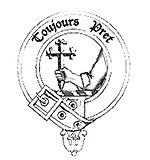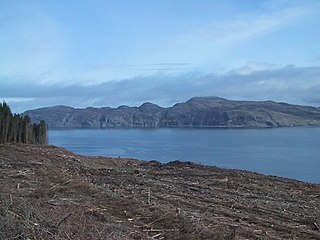Related Research Articles

Lord of the Isles or King of the Isles (Scottish Gaelic: Triath nan Eilean or Rìgh Innse Gall; Latin: Dominus Insularum) is a title of nobility in the Baronage of Scotland with historical roots that go back beyond the Kingdom of Scotland. It began with Somerled in the 12th century and thereafter the title was held by a series of his descendants, the Norse-Gaelic rulers of the Isle of Man and Argyll and the islands of Scotland in the Middle Ages. They wielded sea-power with fleets of galleys (birlinns). Although they were, at times, nominal vassals of the kings of Norway, Ireland, or Scotland, the island chiefs remained functionally independent for many centuries. Their territory included much of Argyll, the Isles of Arran, Bute, Islay, the Isle of Man, Hebrides, Knoydart, Ardnamurchan, and the Kintyre peninsula. At their height they were the greatest landowners and most powerful lords after the kings of England and Scotland.

Clan Donald, also known as Clan MacDonald or Clan Mc Donald, is a Highland Scottish clan and one of the largest Scottish clans. The Lord Lyon King of Arms, the Scottish official with responsibility for regulating heraldry in that country, issuing new grants of coats of arms, and serving as the judge of the Court of the Lord Lyon, recognises under Scottish law the High Chief of Clan Donald. Historically the chiefs of the Clan Donald held the title of Lord of the Isles until 1493 and two of those chiefs also held the title of Earl of Ross until 1476. Queen Mary of Denmark is member of Clan Donald.

Clan MacDonell of Glengarry, also known as Clan Ranald of Knoydart & Glengarry is a Highland Scottish clan and is a branch of the larger Clan Donald. The clan takes its name from River Garry where the river Garry runs eastwards through Loch Garry to join the Great Glen about 16 miles (25 km) north of Fort William, Highland. The progenitor of the MacDonells of Glengarry is Reginald, 4th great-grandson of the warrior Somerled. The clan chief is traditionally designated as the "Son of Alexander's son".
John of Islay (1434–1503), Earl of Ross, fourth Lord of the Isles, and Mac Domhnaill, was a pivotal figure in late medieval Scotland: specifically in the struggle for power with James Stewart, James III of Scotland, in the remoter formerly Norse-dominated regions of the kingdom. His defeat in this conflict led to rebellion against John by his illegitimate son Angus Óg, resulting in the defeat of John's fleet at the Battle of Bloody Bay in the early 1480s. Thereafter and until his death in 1503 John remained an inconsequential figure while, until his murder in 1490, Angus continued to dominate the affairs of Clan Donald. In 1493 James IV brought the Lordship of the Isles to an end.
The Battle of Glentaisie, was an Irish battle fought in the north of Ulster on 2 May 1565. The result was a victory for Shane O'Neill over the Clan MacDonald of Dunnyveg. The conflict was a part of the political and military struggle, involving the English and occasionally the Scots, for control of northern Ireland. Although the MacDonalds were a Scottish family, based principally on the island of Islay in the Hebrides, they had long been associated with the Gaelic polity rather than the Kingdom of Scotland.

Clan Macdonald of Clanranald, also known as Clan Ranald, is a Highland Scottish clan and a branch of Clan Donald, one of the largest Scottish clans. The founder of the Macdonalds of Clanranald is Reginald, 4th great-grandson of Somerled. The Macdonalds of Clanranald descend from Reginald's elder son Allan and the MacDonells of Glengarry descend from his younger son Donald.

Clan Macdonald of Sleat, sometimes known as Clan Donald North and in Gaelic Clann Ùisdein, is a Scottish clan and a branch of Clan Donald—one of the largest Scottish clans. The founder of the Macdonalds of Sleat was Ùisdean, or Hugh, a 6th great-grandson of Somerled, a 12th-century Lord of the Isles. The clan is known in Gaelic as Clann Ùisdein, and its chief's Gaelic designation is Mac Ùisdein, in reference to the clan's founder. Both the clan and its clan chief are recognised by the Lord Lyon King of Arms, who is the heraldic authority in Scotland.

Clan MacDonald of Keppoch, also known as Clan MacDonellof Keppoch or Clan Ranald of Lochaber, is a Highland Scottish clan and a branch of Clan Donald. The progenitor of the clan is Alistair Carrach MacDonald, 4th great-grandson of the warrior Somerled. The clan chief is traditionally designated as the "Son of Ranald's son".
The Clan MacDonald of Lochalsh was a Scottish family and a branch of the larger Clan Donald.

Clan MacDonald of Dunnyveg, also known as Clan Donald South, Clan Iain Mor, Clan MacDonald of Islay and Kintyre, MacDonalds of the Glens (Antrim) and sometimes referred to as MacDonnells, is a Scottish clan and a branch of Clan Donald. The founder of the MacDonalds of Dunnyveg is Eòin Mòr Tànaiste Mac Dhòmhnaill, a son of Iain Mic Dhòmhnaill and Margaret Stewart of Scotland, daughter of King Robert II. Members of the clan actually pronounced and spelled their name M'Connall due to the Gaelic pronunciation of the name Mac Domhnuill thus giving rise to the surname McConnell and its variants. While historically recognised as a clan by the Court of the Lord Lyon, it is now an armigerous clan as it no longer has a chief. The last chief was Sir James MacDonald, 9th of the Clan MacDonald of Dunnyveg or Clan Donald South, who died in London in 1626.

Clan MacAlister is a Scottish Clan. The clan is the earliest branch to have split off from Clan Donald, claiming descent from Alasdair Mòr, son of Domhnall founder of Clan Donald. From Alasdair Mòr the clans takes its surname MacAlister; this surname is an Anglicisation of the Gaelic MacAlasdair meaning "son of Alasdair". In the 15th century the chief of the clan was seated in Kintyre, and the clan was centred there until the 18th century, when a chief sold the family estate in preference to an estate in the Scottish Lowlands.
Hugh of Sleat, pronounced "Slate", who is known as Ùisdean in Gaelic, was a son of Alexander MacDonald, 10th Earl of Ross and Lord of the Isles. He was a member of the Highland and Western Isles Clan Donald. Hugh's clan later became known as Clan Uisdean, Clan Donald North, and Clan Macdonald of Sleat, while the McDonnells of County Antrim in Northern Ireland were known as Clan Donald South.

The Battle of Bloody Bay, or Blàr Bàgh na Fala in Scottish Gaelic, was a naval battle fought near Tobermory, Scotland. It was fought on the coast of Mull 2 miles north of Tobermory, between John MacDonald of Islay, the Lord of the Isles and chief of Clan Donald; and his son, Angus Og Macdonald. The precise date of the battle varies in sources, from 1480 to 1483. After the battle, in which Angus Og Macdonald emerged victorious, the latter seized power from his father, and held it for the rest of the decade. However, Angus's victory would prove pyrrhic. Many clansmen had died in the battle and nearly half the clan's fleet had been sunk, as a result of which the power of the Lords of the Isles was henceforth greatly diminished. Angus, last of the independent Lords of the Isles, would himself be murdered in 1490.
Events from the year 1565 in Ireland.
Lady Agnes Campbell was a Scottish noblewoman and queen consort of Tír Eoghain. She was the mother of Iníon Dubh.

The Keppoch Murders is the name given to the murders of Alexander MacDonald, 12th of Keppoch and his brother Ranald, as a decapitation strike by rival claimants to the chieftainship of the Clan MacDonald of Keppoch. The murders took place on September 25, 1663, during a brawl in the mansion of Insch, just outside the village of Roybridge, Lochaber. The identity of the killers, Alexander Macdonald, Keppoch Tacksman of Inverlair, and his six sons, were well known. Sir James at Dunelm Castle was eventually persuaded by the war poet Iain Lom to apply to the Privy Council in Edinburgh for letters of fire and sword in order to lawfully revenge their deaths.
James MacDonald, 6th Chief of Clan MacDonald of Dunnyveg, was a Scottish-Gaelic lord.
Alexander Carragh MacDonnell, also spelt MacDonald, was the 5th lord of Dunnyveg, Scotland, alive c. 1480–1538.
Donald Balloch MacDonald was a Scottish-Gaelic lord who died about 1476.
Angus MacDonald, 8th of Dunnyveg was the Chief of Clan MacDonald of Dunnyveg.
References
- Macdonald, Angus; Macdonald, Archibald (1900). The Clan Donald. Vol. 3. Inverness: The Northern Counties Publishing Company, Ltd.